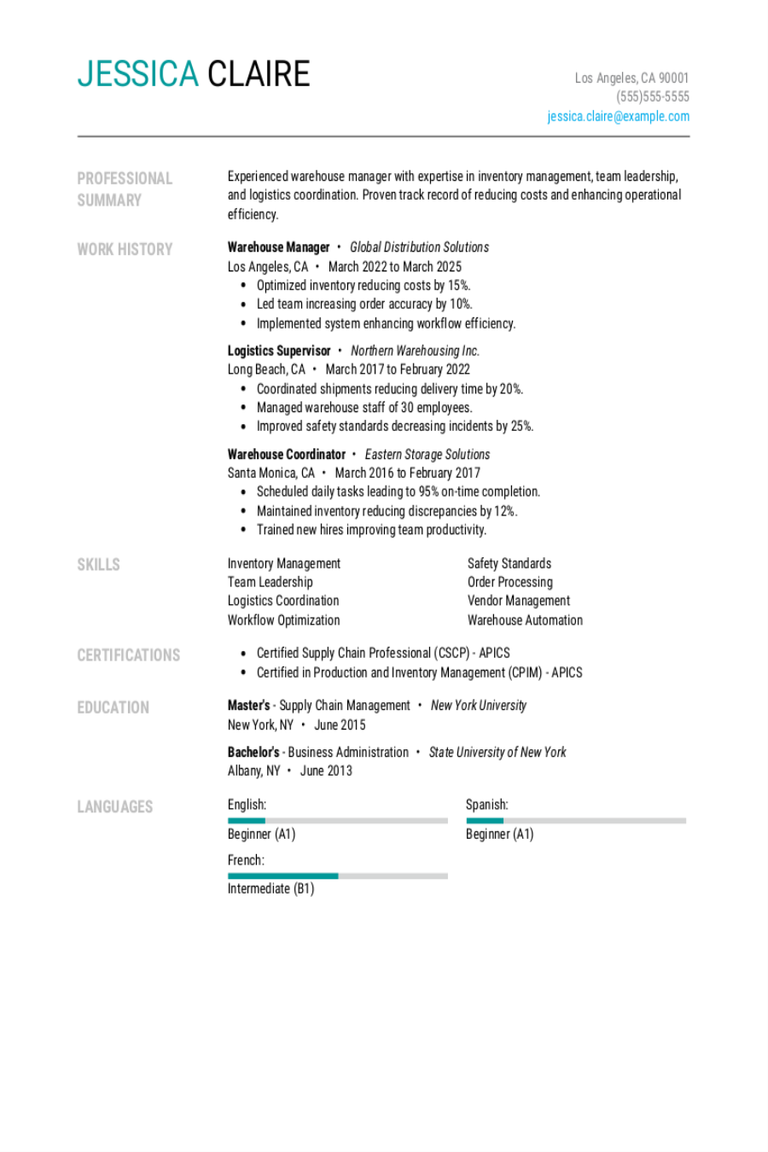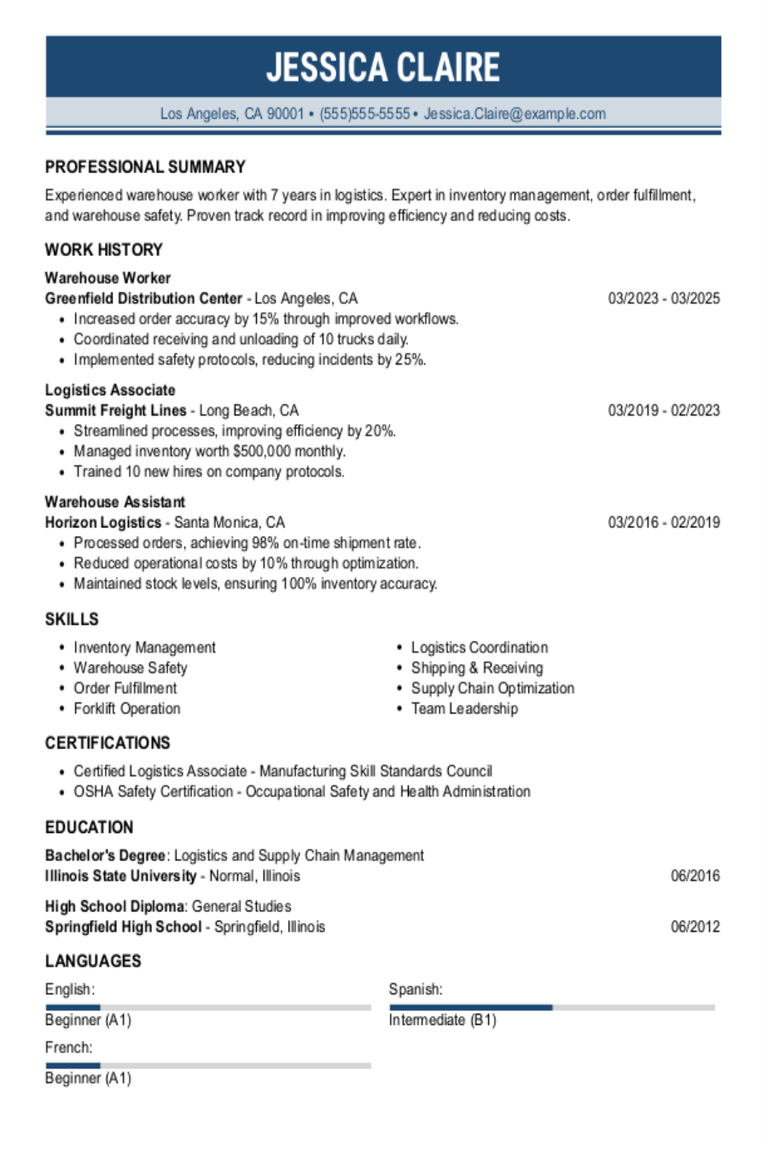Why this resume works
- Quantifies accomplishments: Measurable accomplishments like managing over 10,000 SKUs daily and reducing product damages by 15% showcase the applicant’s impact.
- Showcases career progression: Transitioning from material handler to inventory specialist demonstrates career growth, with increased responsibility like overseeing a team of 15 staff members.
- Illustrates problem-solving ability: Implementing new stock systems and streamlining processes by 20% highlights problem-solving skills and critical thinking.
More Warehouse Stocker Resume Examples
Our warehouse stocker resume examples show how to highlight your organizational skills, attention to detail, and teamwork. Use these inventory management resume samples to create a resume that showcases your strengths in inventory management roles.
Entry-Level Warehouse Stocker
Why this resume works
- Effective use of keywords: Strategically incorporating terms like “inventory management” and “team collaboration” ensures alignment with keywords needed to optimize the resume for applicant tracking systems (ATS).
- Centers on academic background: The education section spotlights a bachelor’s degree in business administration, grounding the applicant’s early career with solid academic credentials.
- Shows digital literacy: Highlighting skills like inventory management and order fulfillment showcases computer skills and digital literacy essential for modern workplaces.
Mid-Level Warehouse Stocker
Why this resume works
- Points to measurable outcomes: The applicant’s knack for boosting workflow efficiency by 25% and increasing inventory accuracy by 15% paints a vivid picture of their impact-driven approach.
- Demonstrates language abilities: Language skills in Mandarin, French, and Spanish showcase the applicant’s ability to bridge communication gaps in diverse settings.
- Displays technical expertise: Certified as a forklift operator with expertise in inventory management, the applicant’s technical skills play a key role in ensuring smooth and efficient warehouse operations.
Experienced Warehouse Stocker
Why this resume works
- Showcases impressive accomplishments: By improving warehouse efficiency by 40% and reducing stock discrepancies by 95%, the applicant’s accomplishments reflect significant business impact and senior-level performance.
- Emphasizes leadership skills: Leading inventory audits to boost accuracy by 20% showcases the applicant’s leadership skills nd ability to effectively manage teams and drive project success.
- Sections are well-organized: With clear headers and concise bullet points, the resume layout ensures sections are well-organized, making it easy to scan and reader-friendly.
Warehouse Stocker Resume Template (Text Version)
David Brown
Tampa, FL 33609
(555)555-5555
David.Brown@example.com
Skills
- Inventory Management
- Warehouse Safety
- Logistics Coordination
- Supply Chain Optimization
- Team Leadership
- Quality Control
- Stock Auditing
- Forklift Operation
Languages
- Spanish – Beginner (A1)
- French – Intermediate (B1)
- German – Beginner (A1)
Professional Summary
Dedicated warehouse stocker with nine years of experience in inventory and logistics. Expert in managing stock processes and improving warehouse efficiency. Proven track record in reducing product damages and enhancing safety measures.
Work History
Warehouse Stocker
LogiStore Solutions – Tampa, FL
January 2023 – July 2025
- Managed inventory for 10,000+ SKUs daily
- Reduced product damages by 15%
- Streamlined stock processes by 20%
Inventory Specialist
ProWarehouse Hub – Jacksonville, FL
January 2018 – December 2022
- Improved order accuracy by 30%
- Oversaw warehouse staff of 15
- Implemented new stock systems
Material Handler
SupplyChain Express – Miami, FL
January 2014 – December 2017
- Coordinated logistics for 250+ deliveries
- Enhanced safety procedures by 25%
- Managed equipment maintenance
Certifications
- Certified Forklift Operator – National Safety Council
- Inventory Management Specialist – APICS
Education
Bachelor’s Business Administration
Ohio State University Columbus, Ohio
June 2014
High School Diploma
Lincoln High School Columbus, Ohio
June 2010
Related Resume Guides
Advice for Writing Your Warehouse Stocker Resume
Explore our tips on how to write a resume for a warehouse stocker position. Whether you’re loading pallets or tracking inventory, your unique skills deserve to shine on paper.

Write a strong professional summary
A professional summary on a resume serves as an introduction for hiring managers, providing a snapshot of your skills and accomplishments. You can decide whether to use a summary or a resume objective based on your experience level and career goals.
A professional summary offers a brief overview of your experience, skills, and achievements in three to four sentences. It’s particularly suited for experienced applicants as it highlights their professional identity and the value they bring to the role by capturing career accomplishments.
Resume objectives are statements that outline your career goals, perfect for entry-level applicants, career changers, or those with employment gaps. Unlike summaries that focus on past achievements, objectives highlight what you aim to contribute in the future.
Next, we’ll provide examples of both summaries and objectives tailored to various industries and levels of experience. See our library of resume examples for additional inspiration.
Warehouse stocker resume summary examples
Entry-level
Recent high school graduate with a strong work ethic and a keen interest in warehouse operations. Completed OSHA 10-hour training and familiar with basic inventory management systems. Eager to contribute to a team-oriented environment, ensuring efficient stock handling and accurate order fulfillment.
Mid-career
Skilled warehouse stocker with over four years of experience in fast-paced distribution centers. Proficient in operating forklifts, managing inventory databases, and optimizing storage layouts for maximum efficiency. Recognized for accuracy in order picking and dedication to maintaining a safe working environment.
Experienced
Seasoned warehouse professional with more than 10 years of expertise in logistics and supply chain management. Demonstrated leadership in supervising teams, streamlining warehouse processes, and implementing inventory control systems that reduced errors by 20%. Known for strong organizational skills and the ability to mentor junior staff.
Warehouse stocker resume objective examples
Entry-level
Detail-oriented and hard-working individual seeking to start a career as a warehouse stocker. Eager to apply strong organizational abilities and physical stamina in maintaining efficient inventory management and contributing to the seamless operation of warehouse activities.
Career changer
Dedicated professional transitioning from retail to warehouse operations, aiming to leverage customer service experience and attention to detail in a warehouse stocker role. Excited about the opportunity to support an organized logistics team by ensuring accurate stock levels and timely order processing.
Recent high school graduate
Ambitious recent high school graduate aiming for an entry-level position as a warehouse stocker. Ready to use quick learning skills and enthusiasm for hands-on work to assist with inventory control, restocking, and maintaining a safe working environment.
Stand out as a warehouse stocker! Use our Resume Builder to create a clean, easy-to-read resume that highlights your skills and gets past applicant tracking systems.
Include relevant certifications and training
For a warehouse stocker, listing certifications and training shows you have the skills needed for the job. These credentials can make your resume stand out to employers and show you’re serious about your career. They are especially important in technical fields or jobs where specific knowledge is required.
A dedicated certifications section on your resume helps highlight these achievements alongside your education. Here are a few examples of certifications for your resume:
- Forklift Operator Certification
- Hazardous Materials Handling Certificate
- OSHA Safety Training
- Inventory Management Course
- First Aid and CPR Certification
Having the right certifications can boost your chances of getting hired as a warehouse stocker. It shows you’re ready to handle equipment safely and efficiently, manage inventory, and ensure workplace safety. Highlighting these credentials makes it easier for employers to see you’re qualified.
Example of a certifications section
OSHA Forklift Operator Certification
Issued by: Occupational Safety and Health Administration (OSHA)
Expires 2025
Certified Logistics Technician (CLT)
Issued by: Manufacturing Skill Standards Council (MSSC)
Issued 2023
Hazardous Materials Management Certificate
Issued by: Institute of Hazardous Materials Management (IHMM)
Expires 2024
CPR and First Aid Certification
Issued by: American Red Cross
Issued 2022
Choose a polished and well-organized resume template that effectively showcases your skills and qualifications to stand out to hiring managers in your field.
Showcase your work experience
When applying for a warehouse stocker position, it’s important to showcase your work experience effectively. This section of your resume tells employers about your past jobs and what you achieved in those roles. Start by listing your job experiences in reverse chronological order.
For each position, include the job title, employer’s name, location, and employment dates. This helps employers quickly see where you’ve worked and when. Using clear language is key; use action words like “organized,” “managed,” or “improved” to describe your tasks and achievements.
Including measurable results makes your work stand out. Instead of just saying you were responsible for stocking shelves, mention that you increased stock accuracy by 15% through better inventory checks.
Highlight key responsibilities relevant to warehouse stocker duties, such as managing inventory, operating forklifts safely, keeping records updated, and ensuring items are stored correctly. These details show what you’re capable of doing in a similar role.
By focusing on these elements in your work experience section, you give potential employers a clear picture of how you’ve contributed positively in past positions. You also demonstrate how you can bring similar value to their team as a warehouse stocker. Keep it simple yet detailed enough to make an impact.
5 warehouse stocker work history bullet points
- Managed inventory for a 50,000 sq ft warehouse, reducing stock discrepancies by 25% through regular audits.
- Streamlined the unloading process for incoming shipments, cutting time by 30% and improving workflow efficiency.
- Coordinated with team members to reorganize storage areas, improving space utilization by 20%.
- Trained new staff on material handling equipment and safety protocols, decreasing workplace incidents by 15%.
- Implemented barcode scanning technology for inventory tracking, improving accuracy in stock management by 40%.
For warehouse stockers, a resume format that highlights efficiency, inventory management skills, and physical stamina can improve your chances.
Match your resume with the job description
Tailoring resumes to job descriptions is essential because it helps job seekers align their skills with what employers are looking for. It also increases the chances of passing applicant tracking systems (ATS), which scan resumes for specific keywords and phrases from job postings.
An ATS-friendly resume uses language that matches the qualifications and responsibilities mentioned in the job listing. By incorporating these keywords naturally, you can better showcase your abilities and get noticed by hiring managers.
To identify relevant keywords, examine the job posting closely. Highlight skills, qualifications, and duties that are repeated or emphasized.
For example, a warehouse stocker role might include terms like “inventory management,” “stock replenishment,” or “shipping and receiving.” Using exact phrases improves your alignment with the position. Incorporate these terms seamlessly into your own experience.
For instance, rewrite “Kept shelves stocked” as “Performed stock replenishment tasks to maintain inventory levels.” This approach ensures that your content reflects both your expertise and the language used in the company’s description. By learning how to customize your resume, you can improve its relevance to the targeted role.
Make your resume stand out by using the ATS Resume Checker to catch formatting mistakes, missing keywords, and structural problems before submitting your application.
FAQ
Do I need to include a cover letter with my warehouse stocker resume?
Yes, including a cover letter with your warehouse stocker resume can give you an edge over other candidates. It provides an opportunity to express your enthusiasm for the role and company, which isn’t always obvious in a resume alone.
You can highlight specific skills like attention to detail or physical stamina that are important for stocking tasks, making your application more compelling. Additionally, if you’ve worked in similar environments before, a cover letter is the perfect place to elaborate on those experiences and how they prepare you for this role.
Consider using online tools like our Cover Letter Generator to efficiently craft your cover letter; these resources offer guidance tailored to various job types and industries. Check out cover letter examples to see how others have crafted theirs.
How long should a warehouse stocker’s resume be?
For a warehouse stocker, a one-page resume usually works well to highlight skills like inventory management, physical stamina, and attention to detail. Focus on your experience with warehouse equipment and any achievements in boosting efficiency or accuracy.
If you have extensive experience or specialized certifications that really matter for the role, going for a two-page resume can be suitable. Just make sure all information is tied directly to warehousing tasks.
Check out our guide on how long a resume should be for more examples and tips tailored to your career stage.
How do you write a warehouse stocker resume with no experience?
If you’re crafting a resume with no experience as a warehouse stocker, highlight transferable skills, education, and related training to stand out. These tips can help you build an effective entry-level resume for the role:
- Highlight transferable skills: Emphasize skills like physical stamina, attention to detail, organizational abilities, and basic computer literacy. These are important for a warehouse stocker role.
- Include any relevant coursework or certifications: If you’ve taken courses in logistics, inventory management, or safety training, make sure to include them. Certifications like OSHA can also be beneficial.
- Leverage volunteer work or part-time jobs: Mention any roles where you’ve had to manage inventory, handle heavy lifting, or maintain organization. Even if it was in a different setting, these experiences are valuable.
- Showcase your willingness to learn: Employers appreciate candidates who are eager and quick learners. Highlight instances where you’ve picked up new tasks or adapted quickly.
Tailor your resume for each application by focusing on the job description and using keywords that match the employer’s requirements.
Rate this article
Warehouse Stocker
Additional Resources

Warehouse Associate Resume Examples & Templates for 2025
Explore warehouse associate resume samples that show how to highlight organizing tasks and managing inventory. Browse tips to help you showcase your strengths in teamwork, attention to detail, and handling

Warehouse Manager Resume Guide + Tips + Example
Looking for a warehouse manager position? These resume examples showcase the right skills — inventory control, team leadership, and logistics expertise — to help your application stand out to employers.Build

General Warehouse Worker Resume Examples & Guide
Explore warehouse worker resume examples and tips to craft a clear, results-driven resume highlighting your physical stamina, attention to detail, and ability to thrive in fast-paced warehouse environments.Build my resumeImport

Warehouse Worker Cover Letter Example + Tips
A general laborer in a warehouse position has to be versatile, reliable and dependable. At any moment, a laborer may be asked to unload a truck with a forklift or

Warehouse Manager Cover Letter Example + Tips
If you really want your cover letter to enhance your resume, make sure you don’t simply summarize everything already pointed out. A warehouse manager cover letter should communicate how talented

Warehouse Supervisor Cover Letter Example + Tips
In addition to basing your cover letter on the free warehouse supervisor cover letter sample, open your introduction with a professional tone. Be sure to address the reader personally. Also,
